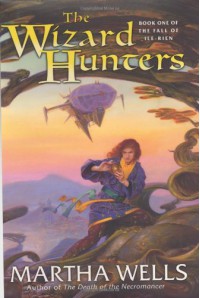The Wizard Hunters by Martha Wells

Warning: slight spoilers below. But stuff I’d have wanted to know.
An obscure epic fantasy that came highly recommended (by Kate Elliott, for instance. I like her books and the way she talks about books, particularly the social consciousness with which she reads, but I have to stop taking her fantasy recs. They’ve ranged from so-so at best – Daggerspell, Banner of the Damned – to unreadable at worst – Irons in the Fire, bleh). But in the end this bored me so much I took nearly a month to finish it, a bad sign for an adventure fantasy book of under 400 pages.
Wells must have heavily workshopped the first sentence – for that matter, the first chapter – because this book started off very well, only to disappoint within the first hundred pages. Here’s the opening:
“It was nine o’clock at night and Tremaine was trying to find a way to kill herself that would bring in a verdict of natural causes in court when someone banged on the door.”
Who could read that and not want to know more about Tremaine, and what has brought her to this point? Not me. Too bad the characterization turns out to be so flat. Tremaine is supposed to be suicidally depressed, but she doesn’t come across as suffering from depression at all, more like a morbid smart-aleck, and once her suicidal inclinations have served their plot function (getting her into a dangerous adventure), they soon disappear, only to be ultimately explained away by magic. I am not sure why Wells felt an external force was needed to “explain” why Tremaine was hit harder by events than others; why isn’t it enough that she’s a different individual, one more prone to depression?
Not that there’s a whole lot of individuality to anyone in this book. Even many of the most important secondary characters, like Florian and Gerard, can be easily summed up as “nice people, who do magic” – more plot function than personality. And the minor characters? Forget about it. I still can’t tell you who that guy Niles was, though apparently he had some importance. And I regularly read books far more populated than this; I keep track of characters like it’s my job.
But back to that beginning. When a character worries about a court verdict in the first sentence of a fantasy novel,* I expect a story built around a highly structured society: something like His Majesty’s Dragon, or Jonathan Strange & Mr. Norrell, or Jo Walton’s Tooth and Claw. For the first few chapters that’s what we get, as Wells builds a fascinating fantasy version of London during the Blitz. But all too soon, the leads are dumped on a remote island and spend 100 pages running around tunnels and fighting. That was where it lost me, and by the time we return to the original setting toward the end of the story, I was so bored by these shallow and static characters that I no longer cared. Nor did the worldbuilding turn out as deep as expected; this is more the kind of fantasy where people conk enemies (mysterious evil invaders with no discernible reason for their belligerence, natch) over the head than the kind dealing with social intricacies.
That said, obviously there is an audience for this kind of thing, and the plot isn’t quite as silly as you might expect from some of the blurbs (which make it sound like it’s all about uncovering the secrets of some magical object – there is some of that, but it isn’t overwhelming). It is not as dire as a lot of fantasy out there, and the writing isn’t terrible, so if you are a reader more interested in plot than character, this may be for you. But after this bait-and-switch I won't be reading the sequels, so I'm glad there's at least a bit of resolution here.
* This part of the sentence apparently meant nothing, just another way of saying "trying to find a way to kill herself that would look like natural causes." I hate it when I'm paying more attention to what a writer is saying than the actual writer is.
 6
6





